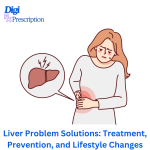
The liver is a remarkably resilient organ, capable of regenerating itself when given the right support. If you’re experiencing liver problems or want to protect your liver health, addressing the root causes and adopting healthy habits can make a significant difference. Below are science-backed solutions to manage and prevent liver issues.
1. Medical Treatments
Depending on the underlying cause, liver problems may require medical intervention:
Antiviral Medications: For viral hepatitis (e.g., hepatitis B or C), antiviral drugs can suppress or eliminate the virus.
Corticosteroids: Used to treat autoimmune hepatitis by reducing inflammation.
Diuretics: Prescribed to reduce fluid buildup (edema or ascites) caused by liver damage.
Chelation Therapy: For conditions like Wilson’s disease (excess copper accumulation).
Liver Transplant: A last-resort option for end-stage liver failure.
Always consult a healthcare provider for personalized treatment plans.
2. Lifestyle Changes
a) Avoid Alcohol
Alcohol is a leading cause of liver damage (e.g., fatty liver, cirrhosis). Quitting or limiting alcohol intake is critical for liver repair.
b) Maintain a Healthy Weight
Obesity increases the risk of non-alcoholic fatty liver disease (NAFLD). Aim for gradual weight loss through diet and exercise.
c) Exercise Regularly
Physical activity helps reduce liver fat and improve metabolism. Aim for 30 minutes of moderate exercise (e.g., walking, cycling) most days.
d) Avoid Toxins
Limit exposure to chemicals (pesticides, aerosols) and unnecessary medications (e.g., excessive acetaminophen), which can harm the liver.
3. Dietary Solutions
A liver-friendly diet supports detoxification and reduces strain on the organ:
Eat Antioxidant-Rich Foods:
Leafy greens (spinach, kale)
Cruciferous vegetables (broccoli, Brussels sprouts)
Berries, citrus fruits, and green tea.
Choose Healthy Fats:
Omega-3 sources like walnuts, flaxseeds, and fatty fish (salmon, mackerel).
Avoid trans fats and limit saturated fats.
Stay Hydrated: Water helps flush toxins from the body.
Limit Sugar and Processed Foods: Excess sugar contributes to fatty liver disease.
Consider Coffee: Studies suggest moderate coffee consumption may lower liver disease risk.
4. Herbal and Natural Supplements
Use with caution and consult a doctor first:
Milk Thistle: Contains silymarin, which may protect liver cells.
Turmeric: Curcumin has anti-inflammatory properties.
Dandelion Root: Traditionally used to support liver detoxification.
5. Prevention Tips
Get Vaccinated: Protect against hepatitis A and B.
Practice Safe Sex and Avoid Needle Sharing: Reduces hepatitis B/C risk.
Monitor Medications: Avoid overdosing on painkillers (e.g., acetaminophen).
Manage Chronic Conditions: Control diabetes, high cholesterol, or hypertension.
Regular Check-Ups: Screen for liver issues if you have risk factors (family history, obesity).
When to See a Doctor
Seek immediate medical help if you experience:
Severe abdominal pain
Persistent vomiting or confusion
Sudden yellowing of skin/eyes (jaundice)
Unexplained bleeding or swelling
Conclusion
The liver has an incredible ability to heal, but it requires proactive care. Combining medical guidance, a balanced diet, and healthy habits can reverse early-stage damage and prevent severe complications. Prioritize your liver health today—it’s never too late to start!
References:
Mayo Clinic. (2023). Liver Disease: Diagnosis and Treatment.
American Liver Foundation. (2023). How to Improve Liver Health.
National Institute of Diabetes and Digestive and Kidney Diseases. (2023). Non-alcoholic Fatty Liver Disease.
World Health Organization. (2023). Hepatitis Prevention and Care.
Healthline. (2023). Natural Ways to Cleanse Your Liver.
Disclaimer: This content is for informational purposes only. Always consult a healthcare professional for medical advice tailored to your condition.
